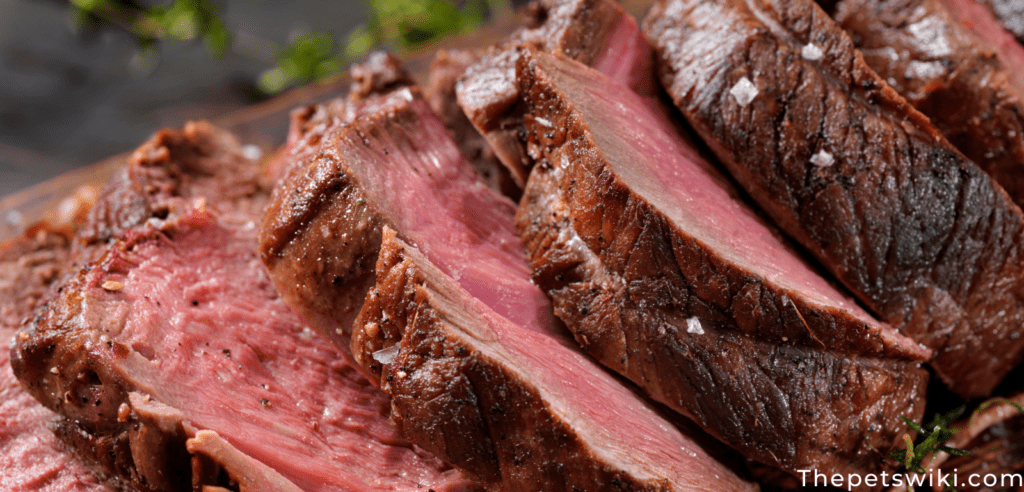Dogs are known to have diverse dietary needs, and as pet owners, it’s crucial to ensure that their meals are not only delicious but also nutritious. One question that often arises is whether dogs can safely consume elk meat. In this article, we’ll explore the nutritional value of elk meat, its potential benefits and risks for dogs, how to serve it, and alternative options.
Nutritional Value of Elk Meat
Elk meat is renowned for its exceptional nutritional profile. It’s a rich source of high-quality protein, essential vitamins, and minerals. Additionally, it contains low levels of fat, making it an attractive option for pet owners looking to provide their dogs with a healthy protein source.

Benefits of Elk Meat for Dogs
- High-quality protein source: Protein is essential for dogs’ overall health, supporting muscle growth, repair, and immune function.
- Rich in essential nutrients: Elk meat contains vitamins such as B12, B6, and niacin, as well as minerals like iron, zinc, and phosphorus, all of which are vital for dogs’ well-being.
- Low in fat: Unlike some other meats, elk meat is relatively low in fat, making it suitable for dogs prone to weight gain or those with sensitive stomachs.
Risks of Feeding Elk Meat to Dogs
- Allergic reactions: Some dogs may be allergic to elk meat, leading to symptoms such as itching, digestive upset, or even more severe reactions.
- Potential for bacterial contamination: Raw elk meat, like any raw meat, carries the risk of bacterial contamination, which can cause foodborne illnesses in dogs.
- High purine content: Elk meat is high in purines, which can contribute to the formation of urate crystals in dogs predisposed to certain types of bladder stones.
How to Serve Elk Meat to Dogs
When feeding elk meat to dogs, it’s essential to cook it thoroughly to eliminate any harmful bacteria. Serve it in small, manageable portions to prevent digestive issues, and monitor your dog for any adverse reactions. Incorporate elk meat into your dog’s diet gradually to assess tolerance and ensure it’s well-received.
Alternatives to Elk Meat for Dogs
If elk meat isn’t readily available or suitable for your dog, there are plenty of alternative protein sources to consider.
Lean Meats
Chicken
Chicken is a staple protein source in many dog diets due to its lean nature and high protein content. It provides essential amino acids necessary for muscle growth and maintenance. However, ensure the chicken is boneless and cooked thoroughly to avoid any potential hazards.
Turkey
Similar to chicken, turkey offers a lean protein source packed with essential nutrients. It is gentle on the digestive system and can be beneficial for dogs with sensitive stomachs. When incorporating turkey into your dog’s diet, opt for lean cuts and avoid seasoned or processed varieties.
Beef
Lean cuts of beef can serve as an alternative protein source for dogs. Beef is rich in iron and B vitamins, promoting energy levels and overall health. Opt for lean ground beef or sirloin cuts, and always cook it thoroughly to ensure safety.
Fish and Seafood
Salmon
Salmon is renowned for its omega-3 fatty acids, which support heart health, joint function, and a shiny coat in dogs. It offers a flavorful alternative to traditional meats and can be served cooked or raw, provided it is boneless and sourced from reputable suppliers.
Whitefish
Whitefish, such as cod or haddock, provides a lean protein source with minimal fat content. It is easily digestible and suitable for dogs with sensitive stomachs. When serving whitefish to your dog, ensure it is cooked thoroughly and free from any added seasonings or sauces.
Shellfish
Shellfish like shrimp and crab offer a unique protein source for dogs. They are low in fat and calories, making them suitable for overweight or senior dogs. However, be cautious of potential allergens and avoid feeding shellfish to dogs with known shellfish allergies.
See Also: Can Dogs Eat Haddock Fish: A Comprehensive Guide
Plant-Based Protein Sources
Lentils
Lentils are a nutritious plant-based protein option for dogs, rich in fiber, vitamins, and minerals. They offer a meat-free alternative for vegetarian or vegan dog diets and can be incorporated into homemade meals or commercial dog food recipes.
Chickpeas
Chickpeas are another excellent plant-based protein source, providing essential nutrients like protein, fiber, and carbohydrates. They can help support digestive health and weight management in dogs. Incorporate cooked chickpeas into your dog’s meals or offer them as a healthy snack.
Quinoa
Quinoa is a gluten-free grain that offers a complete protein profile, containing all nine essential amino acids. It is highly digestible and suitable for dogs with food sensitivities. Cooked quinoa can be mixed with other ingredients to create nutritious meals for your canine companion.
Conclusion
In conclusion, elk meat can be a nutritious addition to your dog’s diet, providing high-quality protein and essential nutrients. However, it’s essential to be mindful of potential risks, such as allergic reactions or bacterial contamination. As with any new food, introduce elk meat gradually and monitor your dog’s response. Consult with your veterinarian to determine the best dietary plan for your furry friend.
FAQs:
Q1: Can dogs eat raw elk meat?
A1: While some dogs may tolerate raw elk meat, it’s generally recommended to cook it thoroughly to eliminate the risk of bacterial contamination.
Q2: Is elk meat suitable for dogs with allergies?
A2: Elk meat can trigger allergic reactions in some dogs. If your dog has known food allergies, it’s best to consult with your veterinarian before introducing elk meat into their diet.
Q3: How often can I feed elk meat to my dog?
A3: Elk meat can be fed to dogs as an occasional treat or part of a balanced diet. However, moderation is key to prevent any potential adverse effects.
Q4: Can puppies eat elk meat?
A4: Puppies can eat elk meat as part of their diet, but it’s essential to ensure that it’s cooked thoroughly and served in appropriate portions suitable for their size and age.
Q5: Are there any specific health benefits of elk meat for dogs?
A5: Elk meat is rich in protein, vitamins, and minerals, which can support muscle growth, immune function, and overall health in dogs. However, individual health benefits may vary depending on the dog’s specific nutritional needs and dietary requirements.


